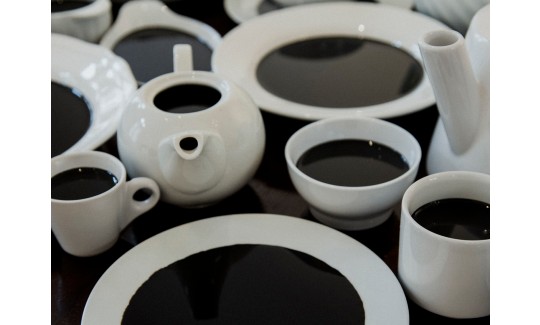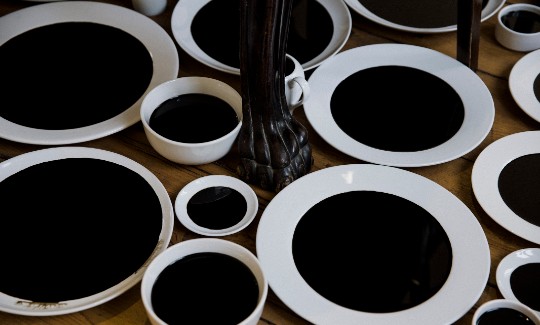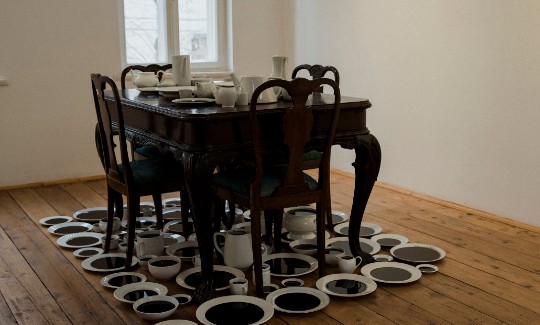"Black Milk"
Belu-Simion Fainaru
Saturday, 05.09.20, 10:00
Monday, 17.05.21
Curator:
Svetlana Reingold
More info:
04-6030800"There is no one home, no one can be at home, home is a permanent condition of deconstruction threatened by destruction from outside."
Bogdan Ghiu*
In his work Black Milk, Belu-Simion Fainaru invites the viewer to contemplate a work that is densely detailed yet whose characteristics are minimal, emphasizing a universal dimension. The black, toxic machine oil, threatening and repelling, is held in white, delicate porcelain utensils with understated decorations. The table and chairs belong to the past, to the artist's parents' living room. This is a forgotten world – one in which we do not await a ghost meal, a meal that will never take place. The sense of absence and nothingness is a continuation of the installation Belongs Nowhere and to Another Time, exhibited at the 2019 Venice Biennale, where Fainaru was chosen to represent Romania.
Throughout his career, Fainaru has employed authentic objects to engage with the concept of home, personal and collective identity, and the components of memory. He disrupts the objects' original functions or draws inspiration from them to create new objects. The installation Black Milk emphasizes contrast, in which one element cancels the other and the two cannot be joined together. This tension places the viewer in a unique situation, a metaphysical or mystical moment similar to a solar eclipse. It is a moment in which the familiar and self-evident cease to exist, undermining conventions and insights. The work's title refers to Paul Celan's famous poem "Death Fugue": "Black milk of morning we drink […] we scoop out a grave in the sky where it's roomy to lie…" (trans.: Jerome Rothenberg).
For many years, Fainaru has been conducting a creative dialogue with authors and poets, with Celan prominent among them. The encounter with Celan's poems entails a fusion of opposites, the discovery of a symbolic reality in everyday life, and a charged connection between the secular and the sacred. Like Celan, Fainaru embarks on symbolic quests in search of the map of his childhood, longing to find a "place that is not a place." In this process, he combines objects and images that create an internal and external journey in the search for that identity and place.
The sense of threatened domesticity, the familial that is destabilized and ceases to exist, and the connection with Celan evoke thoughts of the Holocaust and lives that were cut short. Only objects remain, attesting to a full, rich past, bearing silent witness to the life of the individual and a rich family and community life.
The installation is also relevant to contemporary reality. The family structure and the "family meal" are no longer unquestioned, and the concept of "home" is no longer consensual. Since the outbreak of the coronavirus crisis the domestic space has become, for many, a prison, a stressful environment of individual and family existence. Faced with this unique human condition we can see the installation as a capsule – a familial and human cell that fulfills physical, biological, and psychological needs – the wish to be close to others, feeling family warmth and a sense of belonging.
The black oil stain inside the white porcelain holders suggests a human future that is shrouded in mist. The holder is a kind of "escape capsule" in a human spacecraft that has lost its way – a capsule containing a flaw that can destroy the stable, familiar past and undermine the possibility of a future.
Black Milk offers a metaphor for global and national collective anxiety. The moment in which the connection between the memory of the past and the promise of the future cracks is the moment when domesticity falters and fails; humanism faces a crisis in which self-evident human values collapse, raising open, frightening questions.
Text: Dr. Daniel Weiman
*Quoted from an essay by philosopher Bogdan Ghiu, written following Belu-Simion Fainaru's exhibition No One is Home at Bucharest's Anca Poterasu gallery. Curator: Cristina Stoenescu



